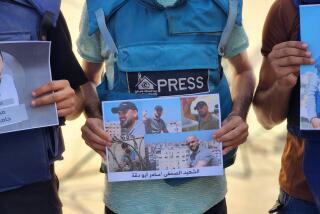Swapping live terrorists for dead soldiers
Hezbollah leader Sheik Hassan Nasrallah and the rest of the region’s terrorists are no doubt rubbing their hands with joy. Israel has once again been humiliated by its Arab foes, and Nasrallah’s depiction of the Jewish state as a “cobweb” polity, a Middle Eastern paper tiger, has been significantly reinforced.
This is the unfortunate upshot of Sunday’s decision by the Israeli Cabinet to swap a cluster of live Lebanese and Palestinian terrorists for the remains, held by Hezbollah, of two Israel Defense Forces reserve soldiers -- Eldad Regev and Ehud Goldwasser -- killed in an ambush in July 2006 along the Israel-Lebanon border. Ironically, the ambush triggered that summer’s war in Lebanon during which Israel tried, and failed, to force Lebanon and Hezbollah to give back the two soldiers, who, we now know, were either killed outright or mortally wounded in the ambush. More than 1,500 Lebanese, including about 500 Hezbollah men, and 160 Israelis died in the 33-day war.
The prospective swap is clearly the desperate act of a weak prime minister and Cabinet driven by emotional public opinion, which is itself driven by a chorus of appeals from the relatives of the two soldiers. It is also only the last in a string of exchanges in which Israel has paid exorbitantly to get its boys back, dead or alive.
The pattern was set in 1983, during the first Lebanon war, when Israel exchanged 4,700 Lebanese and Palestinian POWs/terrorists for six captured Israeli soldiers. Four years ago, Israel handed over 450 Israeli and Lebanese prisoners in exchange for the bodies of three Israeli soldiers and a live renegade Israeli reserve colonel who had been abducted and brought to Lebanon by Hezbollah agents from an Arab country in which the colonel was trying to finalize a drug deal.
Now, for the first time, Israel has agreed to exchange live terrorists simply for dead men, to be brought back to Israel for mourning and burial and to bring definitive closure for the families. Among the terrorists who will be freed is one Samir Kuntar, a Lebanese gunman who participated in the murder of an Israeli family, including two toddlers, in a 1979 raid in Nahariya. Also to be released are four Hezbollah fighters held by Israel, a number of bodies of terrorists and infiltrators, as well as an as-yet-undetermined number of live Palestinian security prisoners.
Critics of the deal, including dovish former Justice Minister Yossi Beilin, have said that leaders’ decisions must be guided by national interests and long-term calculations of gain and loss, not by private or family or emotional considerations.
Yet that is exactly what happened. Since the ambush two years ago, Hezbollah has played a dirty game, contrary to basic international law, of refusing to inform Israel (and the two soldiers’ families) whether the soldiers were dead or alive, instead demanding that Israel release dozens of live terrorists in exchange for the information. Over the months, Israeli intelligence officials determined, on the basis of body tissue left at the ambush site, that the soldiers were almost certainly dead.
But the families, holding onto shreds of hope, pressed the government to do everything it could to obtain their boys’ “return,” managing to mobilize most of the Israeli public and media behind their demand.
A weak Prime Minister Ehud Olmert -- who is the subject of a corruption investigation that has led to calls for his resignation -- along with Defense Minister Ehud Barak, who hopes to return to the premiership and is wary of giving offense to the public, caved in. Olmert presented the deal as highlighting the value Israeli society places on human life and as a testimony to Israel’s “moral strength,” as well as a signal to Israel’s men in uniform that the government will do everything, whatever the price, to obtain their release if captured.
“From our earliest days, we are taught that we do not leave men behind,” Olmert said.
Needless to say, that is not how the area’s Arabs are viewing the affair. The deal will certainly motivate the fundamentalist Hamas organization, which is holding prisoner another Israeli soldier, Gilad Shalit, in its Gaza fiefdom, to raise its price -- about 500 “high-quality” terrorists is the figure currently mentioned as the “price” for Shalit’s release. What’s more, it will encourage all the region’s terrorists to take Israelis hostage.
In the Middle Eastern bazaar for POW bodies, the sky is the limit.
Benny Morris is the author of many books about the Israeli-Arab conflict, including, most recently, “1948: A History of the First Arab-Israeli War.”
More to Read
Sign up for Essential California
The most important California stories and recommendations in your inbox every morning.
You may occasionally receive promotional content from the Los Angeles Times.










